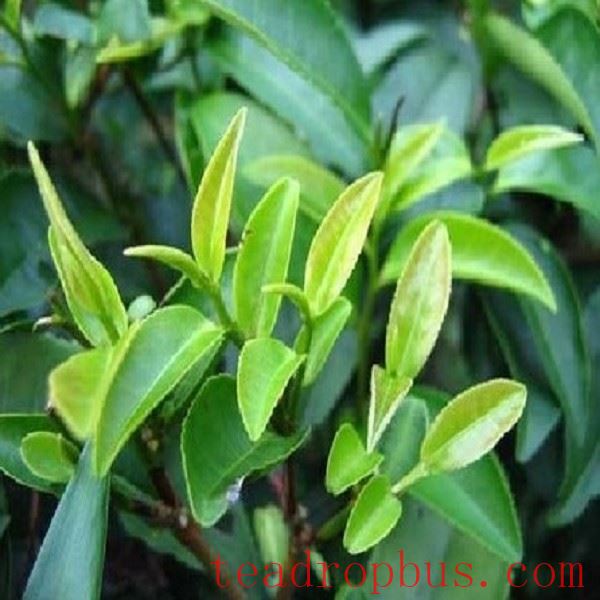
Basic Introduction to Pingle Stone Cliff Tea
Pingle Stone Cliff Tea is a specialty of Pingle County, Guilin City, Guangxi Zhuang Autonomous Region, and it is protected as a geographical indication product for agricultural products nationwide. The geographical indication protection area for Pingle Stone Cliff Tea covers the towns of Yuanshou, Yang'an, Qinglong, Qiaoting, Dafayao Ethnic Township, Pingle Town, Er'tang, and the Guangyun Forest Farm — seven towns and one state-owned forest farm. Its geographical coordinates are between 110°34′–111°02′ East Longitude and 24°16′–24°38′ North Latitude.
Pingle Stone Cliff Tea comes in strip or granular form. Strip tea has thick, sand-green strands that are lustrous with frost spots; granular tea is tightly compacted, heavy, smooth, and dark green in color. It has a rich and lasting aroma, a bright yellow-green liquor, a strong, mellow, and sweet taste, with a noticeable aftertaste, and its leaves remain intact and bright after Steeping. Wild stone cliff tea has an emerald green color, a refreshing fragrance, and contains low levels of tea alkaloids. After tasting, it leaves an endless aftertaste and does not affect sleep. Drinking it regularly in the morning and evening has effects such as clearing heat and detoxifying, protecting the liver and improving eyesight, reducing inflammation and moistening the lungs, nourishing the complexion, lowering blood pressure, reducing fat, and aiding digestion. It is particularly effective for conditions like pharyngitis, obesity, diabetes, high blood pressure, and high cholesterol. Wild stone cliff tea is a precious mountain treasure of the Dayao Mountains.
It grows within the counties and cities of Guangxi, in the southern mountainous areas with short periods of sunlight, large temperature differences, cool and humid conditions on rocky cliffs or beside mountain streams. As this tea grows on cliffs and sheer rock faces, it absorbs the essence of heaven and earth and the vitality of the sun and moon. The unique ecological environment nurtures a purely natural beverage. Pingle County is located in the subtropical monsoon climate zone, with short winters and long summers, moderate temperatures, ample sunlight, abundant rainfall, and a frost-free period of over 310 days. The annual average sunshine duration is between 1414–2094 hours, the annual average temperature is 19.9°C, and the annual average precipitation is between 1355–1865 millimeters, all of which are conducive to the growth of stone cliff tea trees.
Nutritional Value
Wild stone cliff tea has an emerald green color, a refreshing fragrance, and contains low levels of tea alkaloids. After tasting, it leaves an endless aftertaste and does not affect sleep. Drinking it regularly in the morning and evening has effects such as clearing heat and detoxifying, protecting the liver and improving eyesight, reducing inflammation and moistening the lungs, nourishing the complexion, lowering blood pressure, reducing fat, and aiding digestion. It is particularly effective for conditions like pharyngitis, obesity, diabetes, high blood pressure, and high cholesterol.
Product Characteristics
Cliff tea, also known as: stone rock tea, stone mountain tea. Scientific name: Evodia nitida, a species in the genus Euodia, is a tree. It is named for growing on cliffs, with thick buds and leaves, and the tea made from it has a bright liquor. It has a pure taste with a good aftertaste, is durable when steeped, and according to relevant departmental testing, since stone cliff tea does not contain caffeine, drinking it does not affect sleep, and it is rich in flavonoids, which have good Health benefits.
Historical Folklore
The history of drinking Pingle Stone Cliff Tea is long-standing. According to historical records, Li Shangyin, a famous poet of the Tang Dynasty, while serving as acting governor of Zhao Prefecture (today's Pingle) during the second year of the Dazhong era (848 AD), traveled through the mountains and waters of Zhao Prefecture, observed local customs, and wrote the poem “Ji Mu” (“Facing the Scene”): “Over a small kettle of tea by the winding pond, a white-bearded Daoist plays chess amidst bamboo. Who wrote on the broken palm-leaf fan, recording the time of transplanting the tree at Nan Pond.”
According to the Pingle County Gazetteer (1995 Edition): Pingle Stone Cliff Tea is sparsely distributed in the towns of Qinglong, Yang'an, Yuanshou, Er'tang, Dabapo (now renamed Dafayao Ethnic Township), Qiaoting, and Changtan (now part of Pingle Town) within the county. The town with the highest production volume is Yuanshou, while the best quality stone cliff tea is produced in Dagang, Qinglong.
According to the Pingle Agricultural Gazetteer (1991 Edition): In the past, although people generally understood that this tea was cool-natured and had the habit of drinking it under the scorching sun or after strenuous labor, they lacked comprehensive understanding of its practical value and scientific principles. Coupled with primitive and crude production methods, the quality of the tea was poor, and its practical value and economic benefits were far from being fully realized.
In 1974, Pingle County began using the processing method for Guiqing tea to produce stone cliff tea.
Awards and Honors for Pingle Stone Cliff Tea
In 2000, at the Chengdu International Exposition, Pingle Stone Cliff Tea received the honor of “China Famous and Quality Tea.”
In October 2011, Pingle Stone Cliff Tea won the “Gold Award for Best China-ASEAN Tea Culture Promotion.”
On November 18, 2014, the former Ministry of Agriculture of the People's Republic of China officially approved the implementation of geographical indication registration protection for “Pingle Stone Cliff Tea” as an agricultural product.
Tasting and Preparation Methods
1. Gongfu tea: Place about 10g of tea grains and brew with water around 80 degrees Celsius. For three people, you can brew 7-8 times.
2. Cup brewing: Put about 20g of tea grains into a 300ml cup of boiling water and brew 2-3 times.
3. Cold Water Brewing: This method retains the original, clear fragrance and aftertaste of the stone cliff tea.
Store stone cliff tea in a sealed, moisture-proof, light-proof environment, where it can retain its flavor and color for up to a year. It can also be stored in the refrigerator.